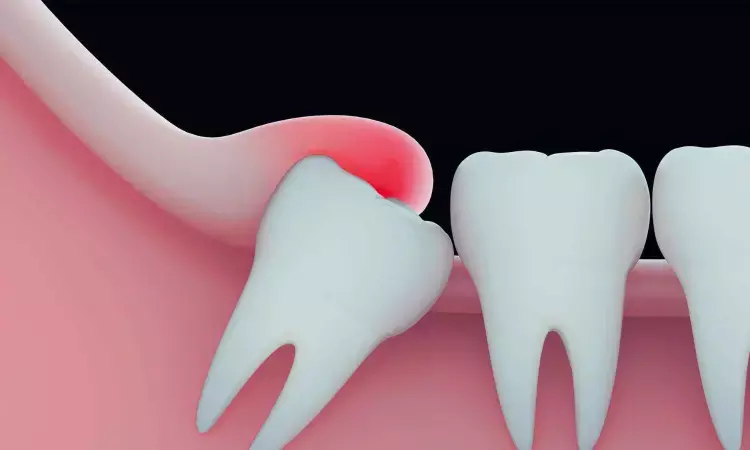- Home
- Medical news & Guidelines
- Anesthesiology
- Cardiology and CTVS
- Critical Care
- Dentistry
- Dermatology
- Diabetes and Endocrinology
- ENT
- Gastroenterology
- Medicine
- Nephrology
- Neurology
- Obstretics-Gynaecology
- Oncology
- Ophthalmology
- Orthopaedics
- Pediatrics-Neonatology
- Psychiatry
- Pulmonology
- Radiology
- Surgery
- Urology
- Laboratory Medicine
- Diet
- Nursing
- Paramedical
- Physiotherapy
- Health news
- Fact Check
- Bone Health Fact Check
- Brain Health Fact Check
- Cancer Related Fact Check
- Child Care Fact Check
- Dental and oral health fact check
- Diabetes and metabolic health fact check
- Diet and Nutrition Fact Check
- Eye and ENT Care Fact Check
- Fitness fact check
- Gut health fact check
- Heart health fact check
- Kidney health fact check
- Medical education fact check
- Men's health fact check
- Respiratory fact check
- Skin and hair care fact check
- Vaccine and Immunization fact check
- Women's health fact check
- AYUSH
- State News
- Andaman and Nicobar Islands
- Andhra Pradesh
- Arunachal Pradesh
- Assam
- Bihar
- Chandigarh
- Chattisgarh
- Dadra and Nagar Haveli
- Daman and Diu
- Delhi
- Goa
- Gujarat
- Haryana
- Himachal Pradesh
- Jammu & Kashmir
- Jharkhand
- Karnataka
- Kerala
- Ladakh
- Lakshadweep
- Madhya Pradesh
- Maharashtra
- Manipur
- Meghalaya
- Mizoram
- Nagaland
- Odisha
- Puducherry
- Punjab
- Rajasthan
- Sikkim
- Tamil Nadu
- Telangana
- Tripura
- Uttar Pradesh
- Uttrakhand
- West Bengal
- Medical Education
- Industry
Nonopioid Therapy Superior for Postoperative Pain Management after Third Molar Surgery: JAMA

USA: Findings from the OARS trial show that nonopioid therapy is as effective or better than opioids for managing postoperative pain after third molar surgery, with consistent benefits across genders, reinforcing its role as a first-line treatment.
Published in JAMA Network Open, the research letter by Janine Fredericks-Younger from Rutgers School of Dental Medicine, Newark, New Jersey, and colleagues, examined whether pain relief and treatment satisfaction differ between males and females following the use of opioid and nonopioid analgesics.
Pain perception is known to vary between sexes due to biological, psychological, and social influences. Previous studies have shown that women often report higher levels of postoperative pain and exhibit lower pain tolerance compared to men.
To better understand these variations, researchers conducted a prespecified subgroup analysis as part of the larger Opioid Analgesic Reduction Study (OARS), which was designed to compare the efficacy of nonopioid and opioid pain management strategies following impacted third molar (wisdom tooth) extraction.
The OARS trial, approved by the Rutgers University Institutional Review Board, was a multisite, randomized, noninferiority study. Participants were randomly assigned by sex and site to receive either a nonopioid combination (ibuprofen 400 mg plus acetaminophen 500 mg) or an opioid combination (hydrocodone 5 mg plus acetaminophen 300 mg). All participants provided informed consent and maintained electronic diaries documenting pain levels, medication satisfaction, sleep quality, and adverse effects during the postoperative period. The primary outcomes assessed were pain intensity and satisfaction with pain management.
Key Findings:
- The study included 1,815 adults (average age 25.7 years; 50% women), with 909 given nonopioids and 906 given opioids after wisdom tooth removal.
- Both groups were similar at the start of the study.
- On the first day after surgery, patients taking nonopioids had better pain relief than those on opioids for both men and women.
- Over the next few days, nonopioids worked just as well as opioids for pain control.
- Satisfaction levels were higher with nonopioids—about 83% of women and 88% of men were satisfied, compared with 76% and 82% in the opioid group.
- Sleep quality was similar in both groups.
- Those taking nonopioids had less pain-related discomfort in the first two days.
- Fewer men needed extra pain medicine in the nonopioid group.
- Side effects were milder and less frequent with nonopioid use.
- Overall, nonopioid painkillers worked as well or better than opioids for both men and women after dental surgery.
"These findings support the use of nonopioid combinations such as ibuprofen and acetaminophen as a reliable, safer first-line alternative to opioids following dental surgery," the authors wrote.
They noted that although this analysis did not directly compare sex-based differences in treatment effects, the parallel outcomes between male and female subgroups strongly reinforce the primary OARS trial conclusion: nonopioid analgesics are not only effective but may be preferable to opioids for managing postsurgical dental pain.
Reference:
Fredericks-Younger J, Andrews T, Lu S, et al. Analgesic Differences in Males and Females After Third Molar Surgery: A Subgroup Analysis of the OARS Randomized Clinical Trial. JAMA Netw Open. 2025;8(11):e2542467. doi:10.1001/jamanetworkopen.2025.42467
Dr Kamal Kant Kohli-MBBS, DTCD- a chest specialist with more than 30 years of practice and a flair for writing clinical articles, Dr Kamal Kant Kohli joined Medical Dialogues as a Chief Editor of Medical News. Besides writing articles, as an editor, he proofreads and verifies all the medical content published on Medical Dialogues including those coming from journals, studies,medical conferences,guidelines etc. Email: drkohli@medicaldialogues.in. Contact no. 011-43720751
Next Story


